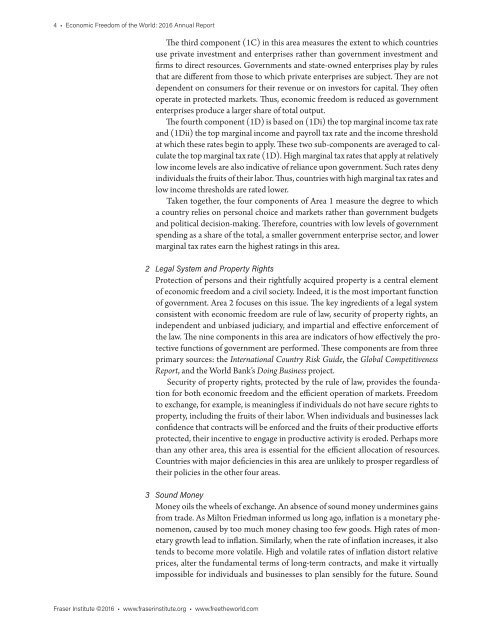Economic Freedom of the World
economic-freedom-of-the-world-2016
economic-freedom-of-the-world-2016
You also want an ePaper? Increase the reach of your titles
YUMPU automatically turns print PDFs into web optimized ePapers that Google loves.
4 • <strong>Economic</strong> <strong>Freedom</strong> <strong>of</strong> <strong>the</strong> <strong>World</strong>: 2016 Annual Report<br />
The third component (1C) in this area measures <strong>the</strong> extent to which countries<br />
use private investment and enterprises ra<strong>the</strong>r than government investment and<br />
firms to direct resources. Governments and state-owned enterprises play by rules<br />
that are different from those to which private enterprises are subject. They are not<br />
dependent on consumers for <strong>the</strong>ir revenue or on investors for capital. They <strong>of</strong>ten<br />
operate in protected markets. Thus, economic freedom is reduced as government<br />
enterprises produce a larger share <strong>of</strong> total output.<br />
The fourth component (1D) is based on (1Di) <strong>the</strong> top marginal income tax rate<br />
and (1Dii) <strong>the</strong> top marginal income and payroll tax rate and <strong>the</strong> income threshold<br />
at which <strong>the</strong>se rates begin to apply. These two sub-components are averaged to calculate<br />
<strong>the</strong> top marginal tax rate (1D). High marginal tax rates that apply at relatively<br />
low income levels are also indicative <strong>of</strong> reliance upon government. Such rates deny<br />
individuals <strong>the</strong> fruits <strong>of</strong> <strong>the</strong>ir labor. Thus, countries with high marginal tax rates and<br />
low income thresholds are rated lower.<br />
Taken toge<strong>the</strong>r, <strong>the</strong> four components <strong>of</strong> Area 1 measure <strong>the</strong> degree to which<br />
a country relies on personal choice and markets ra<strong>the</strong>r than government budgets<br />
and political decision-making. Therefore, countries with low levels <strong>of</strong> government<br />
spending as a share <strong>of</strong> <strong>the</strong> total, a smaller government enterprise sector, and lower<br />
marginal tax rates earn <strong>the</strong> highest ratings in this area.<br />
2 Legal System and Property Rights<br />
Protection <strong>of</strong> persons and <strong>the</strong>ir rightfully acquired property is a central element<br />
<strong>of</strong> economic freedom and a civil society. Indeed, it is <strong>the</strong> most important function<br />
<strong>of</strong> government. Area 2 focuses on this issue. The key ingredients <strong>of</strong> a legal system<br />
consistent with economic freedom are rule <strong>of</strong> law, security <strong>of</strong> property rights, an<br />
independent and unbiased judiciary, and impartial and effective enforcement <strong>of</strong><br />
<strong>the</strong> law. The nine components in this area are indicators <strong>of</strong> how effectively <strong>the</strong> protective<br />
functions <strong>of</strong> government are performed. These components are from three<br />
primary sources: <strong>the</strong> International Country Risk Guide, <strong>the</strong> Global Competitiveness<br />
Report, and <strong>the</strong> <strong>World</strong> Bank’s Doing Business project.<br />
Security <strong>of</strong> property rights, protected by <strong>the</strong> rule <strong>of</strong> law, provides <strong>the</strong> foundation<br />
for both economic freedom and <strong>the</strong> efficient operation <strong>of</strong> markets. <strong>Freedom</strong><br />
to exchange, for example, is meaningless if individuals do not have secure rights to<br />
property, including <strong>the</strong> fruits <strong>of</strong> <strong>the</strong>ir labor. When individuals and businesses lack<br />
confidence that contracts will be enforced and <strong>the</strong> fruits <strong>of</strong> <strong>the</strong>ir productive efforts<br />
protected, <strong>the</strong>ir incentive to engage in productive activity is eroded. Perhaps more<br />
than any o<strong>the</strong>r area, this area is essential for <strong>the</strong> efficient allocation <strong>of</strong> resources.<br />
Countries with major deficiencies in this area are unlikely to prosper regardless <strong>of</strong><br />
<strong>the</strong>ir policies in <strong>the</strong> o<strong>the</strong>r four areas.<br />
3 Sound Money<br />
Money oils <strong>the</strong> wheels <strong>of</strong> exchange. An absence <strong>of</strong> sound money undermines gains<br />
from trade. As Milton Friedman informed us long ago, inflation is a monetary phenomenon,<br />
caused by too much money chasing too few goods. High rates <strong>of</strong> monetary<br />
growth lead to inflation. Similarly, when <strong>the</strong> rate <strong>of</strong> inflation increases, it also<br />
tends to become more volatile. High and volatile rates <strong>of</strong> inflation distort relative<br />
prices, alter <strong>the</strong> fundamental terms <strong>of</strong> long-term contracts, and make it virtually<br />
impossible for individuals and businesses to plan sensibly for <strong>the</strong> future. Sound<br />
Fraser Institute ©2016 • www.fraserinstitute.org • www.free<strong>the</strong>world.com


